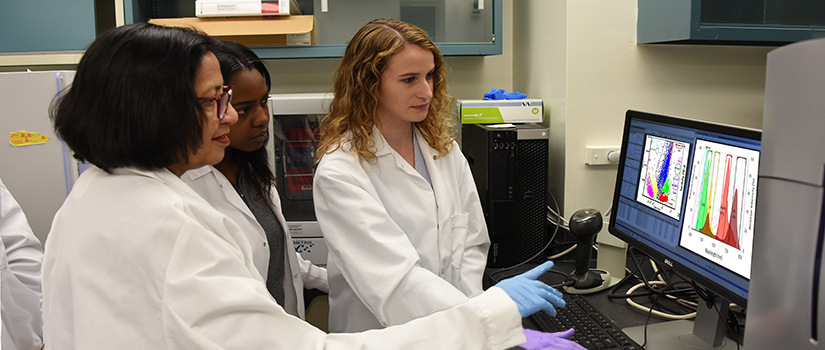Our Faculty
Our faculty specialize in various areas of biomedical research and run successfully funded research programs in diverse areas. They teach medical students and graduate students and serve on various institutional committees. Our faculty are appointed to various grant review committees, hold office at various national and international societies and editorial boards.
Facilities and Resources
Our faculty direct state-of-the-art cores such as the Flow Cytometry and Sorting. Our other shared resources comprise cutting-edge equipment and technology for Advanced Microscopy, –Omics (Genomics, Epigenomics, Transcriptomics and Microbiome technology) and Metabolic Profiling studies. We welcome you to visit us to see our equipment and resources first-hand.
Medical Education
Our department is actively involved in teaching Pathology, Medical Microbiology, and Immunology to our medical students in the M2 year. Our faculty are engaged in teaching various lectures in the new integrated systems-based curriculum for our second-year medical students. We utilize a combination of didactic teaching, active and team-based learning approaches.
This graduate level course covers immune system components, including the innate and adaptive immune system, their functions and interactions. Topics on immune system dysregulation and consequences as related to disease and health are included. Current topics of interest in immunology also are covered. Overall, students will gain an advanced understanding of the immune system.
By the end of this course the student will demonstrate knowledge and understanding in:
- the components of the immune system and their functions.
- interactions between immune system components.
- immune system dysregulation and consequences.
- immune response during health and disease.
This course is offered in Fall and Spring semesters, primarily to graduate students who have a background in basic Immunology. The format of the course is as a journal club wherein 2-3 papers will be discussed on a weekly basis on current immunology literature that has appeared in high-impact journals like Science, Nature, Nature Medicine, Nature Immunology, Proceedings of the National Academy of Sciences, USA, Journal of Experimental Medicine, Journal of Immunology, Cell and Immunity.
The scientific paper discussion will include Introduction, Materials and Methods, Results, Discussion and Bibliography. One of the most important aspects of this course is to train the student to critique research and to improve the quality of their research by incorporating novel concepts and techniques.
This course is designed to provide graduate students with a fundamental biomedical knowledge base in human pathology and an introduction to the study of the disease process. Particular emphasis will be given to the etiology, pathogenesis and description of gross and microscopic pathologic patterns occurring during the progress and outcome of major human diseases and conditions.
Students will be introduced to the experimental approach of the development and subsequently effective treatment of certain diseases, through the description of animal models simulating related pathologies. With the knowledge of normal histology, and by gaining familiarity of microscopic appearances through a hands-on experience at the lab small groups, students will develop observational and descriptive skills and ultimately deepen their understanding of the underlying mechanisms of disease. By the description of the experimental methodologies, including the murine models of various diseases, they will formulate the causative approach in the study of disease.
Research Area Focus Groups
The research interests of our faculty fall under the following main thematic groups.
- Prakash Nagarkatti - Epigenetic regulation of inflammatory and autoimmune diseases, including multiple sclerosis and autoimmune hepatitis.
- Mitzi Nagarkatti- Effect of microbiome in inflammatory diseases such as colitis, obesity and cancer.
- Angela Murphy – Role of macrophage-induced inflammation in colon cancer.
- Carole Oskeritzian – Targeting skin inflammation in atopic dermatitis.
- Jason Kubinak – Interaction of primary antibody deficiency and inflammation caused by host-microbiome dysbiosis.
- Narendra Singh – Role of aryl hydrocarbon receptor in lupus, MS and diabetes.
- Kandy Velazquez – Involvement of macrophage-produced tumor necrosis factor alpha in preclinical models of colitis and colon cancer.
- Angela Murphy – Effect of exercise in obesity and metabolic disorders.
- Reilly Enos – Cellular and molecular mechanisms in induction of obesity and metabolic syndrome.
- Prakash Nagarkatti - Cannabinoid receptor antagonists in the treatment of obesity.
- Mitzi Nagarkatti - Gut microbiome in obesity.
- Kandy Velazquez – Role of exercise and obesity in muscle wasting disorders.
- Carole Oskeritzian – Role of mast cells and eosinophils in allergies including asthma and atopic dermatitis.
- Swapan Ray – Use of chemoimmunotherapy in treatment of glioblastoma and neuroblastoma.
- Angela Murphy
- Carole Oskeritzian – Targeting Sphingosine-1 phosphate in macrophages and mast cells for cancer therapy.
- Mitzi Nagarkatti – Role of microRNA in induction of apoptosis in tumor stem cells from neuroblastoma and melanoma.
- Prakash Nagarkatti - Epigenetic regulation colon cancer by plant products.
- loulia Chatzistamou – Molecular mechanism underlying carcinogenesis.
- Deepak Bhere – H. pylori induced carcinogenesis.
- Kandy Velazquez – Characterization of spontaneous pain in colorectal cancer.
- Prakash Nagarkatti – Epigenomic studies on the effects of plant products (resveratrol and cannabinoids) in the treatment of multiple sclerosis, colitis and obesity.
- Mitzi Nagarkatti – Effects of dietary supplements (indoles, etc.) on regulation the microbiome in colitis, acute lung injury, MS and obesity.
- Angela Murphy – Role of exercise and dietary products (curcumin, quercetin and emodin) in breast and colon cancer as well as obesity-driven cancer progression.
- Narendra Singh – Therapeutic efficacy of resveratrol and other AhR ligands on MS, lupus and diabetes.
- Kandy Velazquez – Development of dietary quercetin to treat muscle wasting disorders. The effects of Ojeok-san on neuro-immune interactions in cancer-induced visceral pain.
Join Us
See open faculty and staff opportunities here.
Students interested in internship opportunities can reach out to our faculty members directly, here.
